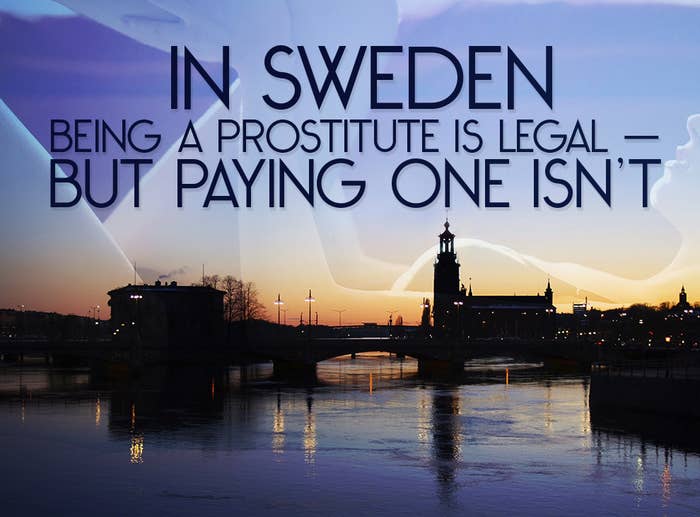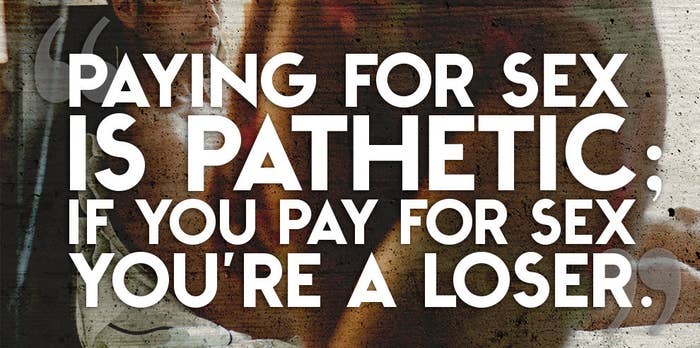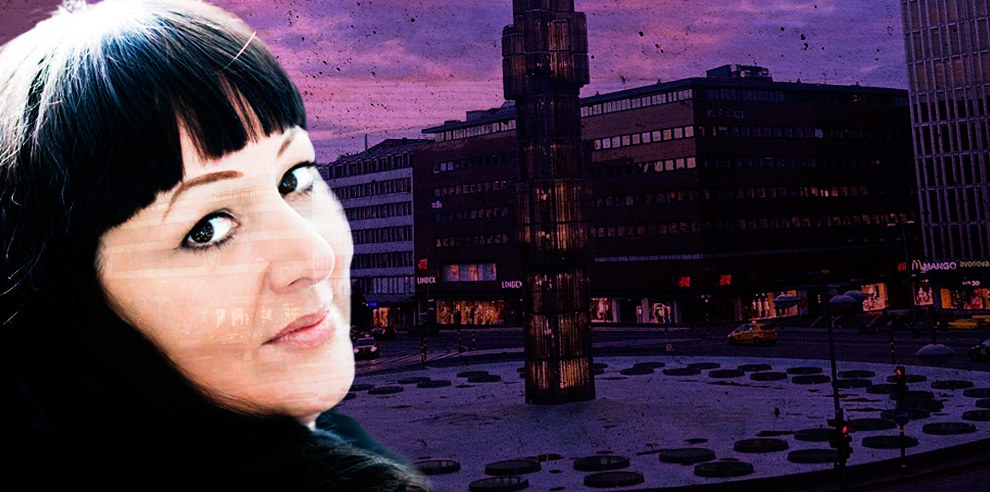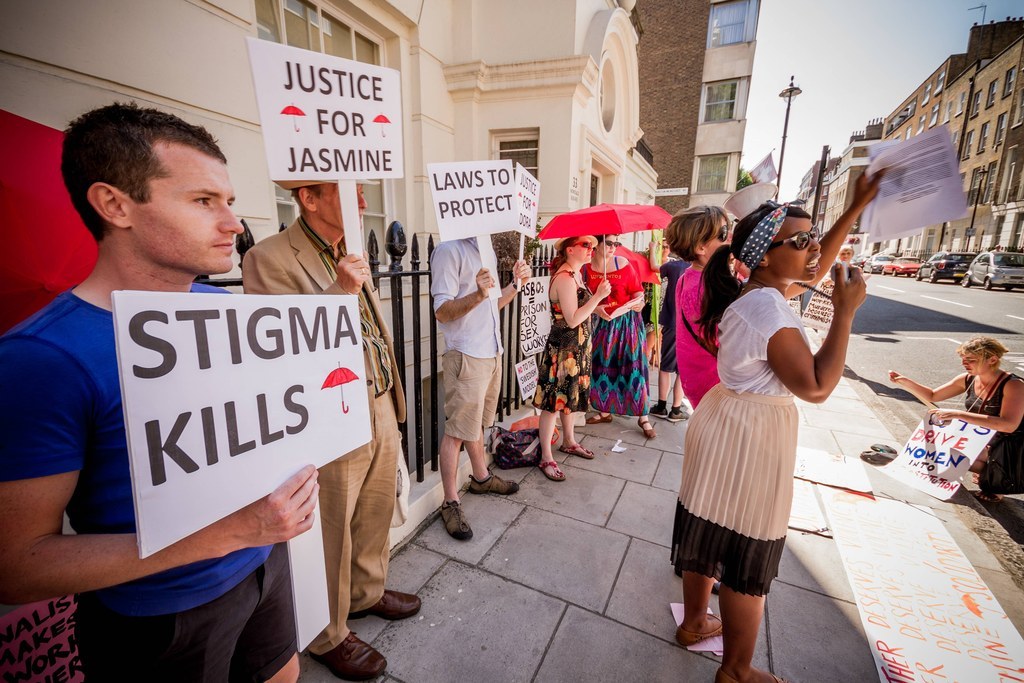
STOCKHOLM — If you want to trade money for sex, Stockholm's red-light district is likely to disappoint you. Empty and quiet at nearly 10 p.m. on a recent Thursday evening, its central street looks more like a small city's business district buttoned down after hours than an illicit sex market.
The nearly half-mile long Malmskillnadsgatan Street begins at the bay that rings Sweden's parliament building, crosses over a glowing shopping plaza, and ends at a cluster of high-rise offices and a subway stop. There, two middle-aged women with short skirts, long blonde hair, and light puffer jackets emerge and stroll slowly toward the water. When they run into a young man, they light cigarettes and chat him up. An hour later, they're still talking.
In Sweden, all that chatting could make the young man a criminal. In the fight to stamp out transactional sex, the Swedes have flipped the prostitution paradigm on its head. Here, prostitution is perfectly legal. Women (or men, for that matter) can sell all the sex they want. It's only illegal for a man — and it's almost always a man — to pay for it.
"This is really difficult for people around the world to understand," said Olga Persson, the secretary general of the Swedish Association of Women's Shelters and Young Women's Empowerment Centers. "I can see that in the eyes of people when you talk about it."
Persson believes this arrangement protects women, challenges gender stereotypes, and puts society on a path toward reducing violence against women. Supporters of the law say it has reduced street prostitution, helped curb sex trafficking, and shifted the social shame that has always stigmatized transactional sex away from women and on to men.
The 15-year-old law has been copied in Norway and Iceland; Finland and the United Kingdom have adopted a modified version. But this year, the approach now known as the "Nordic model" has seen its influence skyrocket. The European Parliament — where just four years ago "people were actually laughing about the Swedish legislation," said Persson — endorsed the model in February. A French Senate committee this week is considering a bill based on Sweden's law, after the lower house approved it in December. Ireland has been considering the Nordic model as well, and this week Canada is holding hearings into whether it should jump on the Swedish ship.
But not everyone — not even every Swedish feminist — agrees the Nordic model is the answer. Inside Sweden, differing opinions on the legislation divide progressive groups that are often otherwise allies, and critics of the legislation say they are under pressure to conform to a rigid sense of political correctness.
And outside Sweden, health organizations and even some human rights organizations wonder if the Swedes actually have it all wrong.

There has not been any independent review of the Swedish legislation, but a 2010 government evaluation of the law cast it in glowing terms. Street prostitution had been halved, human traffickers had taken up with other countries because the law made it too difficult to work, and fewer men had reported buying sex, the report said.
But even the law's supporters acknowledge that drops in street prostitution, which countries without similar legislation have also seen, are more likely related to the advent of the internet, where it's easier than ever to offer or find sexual services, than to the power of the Nordic model.
As for men buying sex, the government evaluation raised more questions than answers. Were fewer men actually buying sex in Sweden thanks to the law, or were fewer men admitting to being johns — and thereby outing themselves as criminals in a government inquiry?
Sweden's national criminal statistics paint a less positive picture than the government evaluation. The number of sex buyers has been going up since 2008 — increasing from 187 in 2008 and hitting a peak of 1,251 in 2010 before falling again, in 2012 and 2013, to around 550.
But were more men buying sex in spite of the law — or were more men getting caught buying sex?
Kajsa Wahlberg, the national rapporteur on human trafficking, said the rise in buyer numbers came after the government increased funding to target traffickers, and the prostitution enforcement arm of the police benefited from some of that money. That funding ended in 2011, and the numbers have again hit "normal" levels for sex-buying, she said.
But these wild variations make it difficult to know with confidence what the real number of men buying sex may be. In fact, on almost all fronts, "it's very hard to tell" how well the law is working, said Kristina Ljungros, of the Swedish Association for Sexual Education (RFSU). "We don't have enough evidence."
Ljungros' organization is the preeminent national institution on sexual health, and has found the research so limited and "so colored by [differing] perspectives" that it has commissioned its own comprehensive research review to help craft an official position on the law; the group hopes to complete the review by October.
Whatever the statistics, Patrik Cederlöf, Sweden's national coordinator against prostitution and trafficking, feels confident that the country is onto something. "I was on the street when we implemented the legislation, so I have seen the before and after," said Cederlöf. And though the numbers are a little loose, he thinks the legislation has worked. "There's still a lot of demand, a lot of clients, of course, but at the same time, I would say the situation is better here than in many other countries."
That's especially true, many Swedish government officials say, if you look at figures for sex trafficking. The International Labor Organization estimates that the commercial sex industry makes up $99 of the $150 billion in worldwide illegal profits from trafficking. Recent research suggests that "abolitionist" countries where prostitution is fully legal, like Germany or the Netherlands, also have high levels of human trafficking. (The Netherlands fully legalized prostitution in 2000, and Germany in 2002, meaning that unlike in Sweden and other Swedish-styled countries, brothels and other third-party "exploitation" are also legal.)
Even the best research doesn't yet show that legalizing prostitution causes an increase in sex trafficking, and the underground nature of trafficking means good data is limited — so limited, in fact, that the Netherlands' rapporteur on trafficking wrote in a report last year that recent research advancing a connection was ultimately "inconclusive."
But Swedish law enforcement authorities say they've seen it for themselves.
The ban on buying sex "has kind of saved us," said Wahlberg. In telephone surveillance records shared by other countries, "we can clearly hear that criminals are discussing amongst themselves, 'Where shall we bring the women?' [They think] Sweden is not a good country because the clients are afraid, you have to move women around, you can't send them to the streets, and there are no brothels."
All of that would mean traffickers make less money from each woman and need more time to make it. The numbers seem to support that, at least: Last year, Sweden identified only 40 cases of sex trafficking, according to the State Department's annual report on human trafficking, released in June.
It's not just the ban on buying sex that makes Sweden tough on traffickers. There's another law banning both exploiting sex sellers and benefiting materially from their exploitation.
Wahlberg says the law is designed to target pimps, but admits it's not foolproof. Most of those nabbed by the law are middle managers; the masterminds run the show from abroad, over cell phone and email.
Women who sell or have sold sex, like Pye Jakobsson, say the "procurement law," as the anti-pimping legislation is known, can make it difficult for sex workers to find safe places to work or even to keep their apartments.
"Under the pimping laws, if a landlord finds out someone is selling sex in one of his apartments that he rents out, he has to evict them or he will be charged with pimping," said Jakobsson, who runs the pro-prostitution advocacy group the Rose Alliance and is the president of the Global Network of Sex Work Projects.
Wahlberg insists that this interpretation is erroneous, although the law itself clearly carves out such overly broad powers (which can and are also used against hotels) on what it calls "procuring." Still, she and other Swedish government officials who oversee the country's sex industry regulations say they couldn't think of a single such case.

Sex worker safety is a hotly contested topic in Sweden. Jakobsson is an outspoken critic of the Swedish legislation, arguing it has made prostitution more dangerous.
Men who need to dodge the law won't fix a time and a place to meet, she says. Often they insist instead on picking a woman up at a public location and driving her somewhere — somewhere she may not know. "When you're in your own place, you can hide knives, pretend someone is in the next room, have someone in the next room, or do whatever you need to do" to protect yourself, Jakobsson said. Street prostitutes could keep an eye out for each other, note license plate numbers, and make calls if a woman had disappeared for too long. All those informal protection measures have disappeared with the new law, she said.
Jakobsson also argues — and cites reports from the International Labor Organization, the United Nations-backed Global Commission on the Law and HIV, and the World Health Organization — that criminalizing either end of transactional sex makes it more difficult to protect the health of women and men who sell sex.
The "harm-reduction approach," as public health arguments against criminalization are often called, seems to have persuaded some human rights groups, including Amnesty International, which caused a stir in January when a draft of its proposal to support decriminalization of sex work was leaked. Chairs of national chapters met in London last month to debate the proposed policy but couldn't agree on a position and left a final decision to the group's international board, which meets in October.
The harm-reduction approach tends to focus on curbing HIV and other sexually transmitted infections. Supporters of the law say free condom distribution and other forms of outreach can mitigate that threat, but agnostics like Ljungros, of RFSU, aren't so confident that theory turns into practice. The state's overall goal is the reduction of prostitution, and she said this question always comes up: "Can we distribute condoms to people selling sex? Is it then encouraging them to sell sex?"
Then there is the question of whether a buyer will actually use that condom. Critics, and some research, suggest that the law has increased the power that men buying sex hold over the women who sell to them. Jakobsson says clients in Sweden today have more power to demand riskier sex, from refusing to use condoms to engaging in edgier sexual practices. And a study by Swedish researcher Gabriella Scaramuzzino found that the law inspired buyers to organize themselves to leverage a kind of collective bargaining power. They used the internet to review their experiences, in chatrooms that function like a Yelp for transactional sex, and they banded together to demand "consumer rights," like a money-back guarantee.
It is ironic that men are innovating to preserve their power in these transactions, considering that the goal of the Sex Purchase Act was, above all, to help equalize relations between men and women.
The law was passed in 1999 in a package of bills targeting violence against women, and every supporter of the law interviewed used the word "normative" to describe its essential purpose: to change how Swedes feel about buying sex — not because it's risky sexual behavior or because it's immoral, but because it perpetuates male domination.
"The legislation is based on the feminist view that men as a group have more power than women as a group," Persson says. "Prostitution is a symbol for me…of the whole male power over women around the world."

Feminism — or rather, whose feminism is the right feminism — is itself at stake in Sweden's debate over this legislation. Swedish women's organizations, and the state itself, think feminism means protecting women in prostitution from people who want to exploit them.
But not every woman working in prostitution wants to be protected by the state.
Carina Edlund comes from northern Sweden. At a bar in Stockholm, she said playfully, "I shouldn't be here. I should be making babies." Her father is a lumberjack. Her mother stayed at home. She comes from a socially conservative town that wasn't thrilled with her early life choices. "They were praying to get the LGBT out of me. It didn't work," said Edlund, now in her thirties. "Now they have to pray to get the sex worker out of me too."
Edlund objects, strenuously, to the idea that she's been oppressed into sex work. "They say we suffer from a false consciousness, that this can't be a choice," she said. "They think we are mentally ill."
Though they won't say so directly, it's clear that all the major supporters of the law don't believe women like Edlund. They point to histories of abuse or drug addiction, both of which she has suffered and are fairly common among sex workers, as evidence of exploitation, of the absence of free will among the women who survived those experiences and went on to sell sex.
But Edlund doesn't feel that way.
In fact, there's a lot about her sex work that defies society's understanding of the way she earns a living — and she has grown a bit impatient about it.
"I don't know why I should have to [resolve] confusion for the common man. I am a sex worker. I have truly been in and from rehab. I'm gay. And I sell sex to men," she said.
It's arguments like these that make Kristina Ljungros, of RFSU, unsure of her country's law. It may very well be that the law is society's way of demonstrating its concern for vulnerable women. But, she said, it also creates "the problem of telling women, 'You don't have a right to your own body.' What are you allowed to do? What kind of decisions are you allowed to make? Are you allowed to work in an industry in India where you make, like, nothing? Are you allowed to make that decision?"
Most supporters of the law don't believe women like Edlund exist, or if they do, there are so few of them that it makes little difference.
"From a Swedish perspective, it kind of doesn't matter," said Stephanie Thögersen of the Swedish Women's Lobby, one of the strongest supporters of the law. "We never get to the discussion of the happy whore. The bigger question is, what kind of society do we want to live in?"
Cederlöf, whose office is a point of contact for women seeking to leave prostitution, says there are too few women like Jakobsson or Edulund to allow those objections to carry the day.
"From my point of view, it's more like majority and minority groups. In all democracies, sometimes the minority has to step back because the majority thinks the same way. I think it's the same here," he said.
"The girls and women we meet here… they will not be the ones standing on the barricades saying, 'We want to do this. This is our choice,'" he said. "When you meet this person [in prostitution] and you give him or her some questions, you can hear that this was the only option. That's the whole point: Someone is making money off this person."
Of course, Cederlöf's work isn't likely to connect him with the women who advocate politically around their free will to sell sex. But a 2003 study suggests Cederlöf may indeed have his pulse on the majority. The study of 854 women in prostitution in nine countries found that 89% of them would like to get out.
For so many supporters like Thogersen and Cederlöf, this law is less about individual women than it is about a collective social statement. When it passed, the law was bundled with other legislation focused on reducing men's violence against women. Supporters today gladly talk about positive outcomes they attribute to the law, like low levels of sex trafficking nationally, but the more questionable results, like whether the law actually reduced street prostitution, are waved away with a reference to principle.
To supporters, it simply seems implausible — and incompatible with feminism — that the law might in any way undermine women's rights.
"How can this be something that you think is not a problem?" Persson said. "If you don't consider prostitution to be violence against women, how can you say you're a feminist? If it harms women, how can it be good?"
The feminist position is so exclusive that women like Ljungros, of RFSU, say their own opinions — and sex workers' voices — have been stifled.
"We get really criticized by the women's movement because of our standpoint on this law," she said. "The [prevailing] view is too narrow — that you're not even allowed to raise other questions, actually take a debate on things… We have different positions in this organization; some support it, some don't, and we have people within the organization selling sex, and I really want to listen to their voices."
Persson, on the other hand, thinks the issue of sex work has challenged groups like RFSU. She thinks objections to the law sometimes confuse the right to buy sex with broader rights around sexuality.
"The ones who are really questioning the legislation or questioning the debate are … mostly homosexual or bisexual men who say, 'I used to sell sex and I didn't have a problem with that. So you are moral weirdo Christian blah blah blah male-hating whiner,'" Persson said.

The debate over whether a woman or a man can knowingly and freely choose to earn a living by selling sex is built into the very language Sweden uses to talk about the issue.
"We don't say sex work, because we don't see it as work at all," said Cederlöf. In fact, every single person who supports Sweden's buying ban said exactly this, in exactly this way, when I asked what they thought about the term "sex worker."
Cederlöf continued: "We don't say prostitutes, either. We say 'people in prostitution.' It's something you are doing. You are not a prostitute. You can quit and stop and then be like anyone."
The implication, though, is that women who work in prostitution are in fact not like anyone. As women who sell sex, they are a class apart.
Ironically, that particular attitude has deep roots in the patriarchy the law is supposed to upend. Hanna Olsson, a Swedish feminist, described the way oppression of women was built even into the language of prostitution. "In Swedish the only word you never, ever use to describe [a prostitute] is woman," said Olsson, whose report sparked a years-long national debate and laid the groundwork for the law passed two decades later. "She can be a lot of things — dirty words, 'cunt,' 'whore,' whatever, but just to state the single fact that it's a woman — it's the only thing that she's not. Because she is the 'other' one, and she will not be included in the human race and in the female community."
The Swedish state may have improved upon an earlier generation's misogynist language, but that otherness still influences conversations about sex workers (or "women in prostitution"). No one I talked to in Sweden would acknowledge that banning the purchase of something because it is bad also implies disapproving of anyone who would sell such a thing. "We don't criminalize the seller," the law's supporters all said.
But "the seller" is still a social problem, a woman to whom rumor and stigma and social disapproval are attached. "The problem with stigma," said Jakobsson, is that it "affects everything in your life. Not the sex work, but everything else. No one can know in order not to lose your apartment, lose custody of your kids."
Jakobsson told me the story of one young woman, named Eva Marree Smith Kullander but known by her street name, Petite Jasmine. She lost custody of her two children because of her line of work; her partner, who had a criminal record for violent behavior and had been issued restraining orders to stay away from two other women, was given custody instead.
A judge later ruled that a series of supervised visits might allow for joint custody. Jasmine's partner would bring the children to a social worker's office, and Jasmine would meet them there.
One day last July, her partner allegedly showed up at one visit with a knife. He then allegedly (he hasn't been convicted) stabbed the social worker, who survived, and Jasmine, who did not.
Swedish authorities don't consider this a "murder related to prostitution" because Jasmine wasn't killed on the job, or with a motive connected to her work. But sex worker rights' groups around the world issued statements condemning the Swedish law because of the murder, and Jakobsson and Edlund, who worked with her on advocacy efforts at the Rose Alliance, insist that she wouldn't have lost custody of her children if she had earned her money any other way.

Indisputably, the biggest change since Sweden outlawed sex-buying is that
stigma finally cuts both ways. Men are afraid — and ashamed — of buying sex.
Young Swedes think "paying for sex is pathetic; if you pay for sex you're a loser," said Kajsa Ekis Ekman, the author of Being and Being Bought. "Today if you come out and say you've gone to a prostitute, people would look at [you] like, 'What? You can't get it yourself? You can't even talk to women? You can't charm anyone?'"
It's more than emasculation. Getting caught buying sex can endanger a man's job, affect his career prospects, even limit his chance at a bank loan, Wahlberg said.
And Sweden's appetite for social shaming seems voracious. Though men can quietly pay a fine — the equivalent to two months' salary, calibrated to an individual offender's earnings — tabloids regularly expose men charged with purchasing sex. In 2010, Sweden's justice minister suggested sending notice of alleged sex-buying to a suspect's home in a purple envelope so that he couldn't hide his derelict behavior from his family or his neighbors (or, for that matter, his mailman).
The weight of all that communal approbation creates severe stress during an arrest. "The men that [the police] caught were really, really, really upset. Not just upset — the whole world was falling down for them," said Johan Christiansson, a social worker with the city of Stockholm. "They were crying and they were saying they were going to commit suicide."
By 2009, Sweden's police knew they needed to target sex buyers with social support, just as they had built resources for women in prostitution looking to get out. So Christiansson teamed up as an outreach counselor with a special prostitution squad of Sweden's police. It didn't go well at first: He roamed the streets with brochures that no man wanted to touch. "I fe[lt] a little stupid as well, walking up and saying, 'Hi there!'" he said. "I felt a little bit like a Jehovah's Witness or something."
But when he tagged along for night patrols, things changed. The police would catch a buyer in a sting, ask him a few questions, and write up a notice. At that point, the newly minted criminals would freak out.
"It's a very existential moment for them, when, you know, somebody has done something in the shadows and all of the sudden there's a flashlight on them," he said. "They were really confronted not only by authorities and society, but also with themselves: 'Who am I? What have I done? How stupid can you get?'"
Christiansson has been a social worker for 15 years. He spent a decade working with drug addicts before switching to sex buyers. Once a week, he conducts voluntary counseling with roughly a dozen men who've been caught buying sex. Five years into his work, Christiansson may know more about what drives these men — and the demand for transactional sex that Sweden's law still hasn't curbed — than anyone else in the country.
"Most of them are 35–50 years old. They have an all right career, some middle-class thing, and they've got children," he said. Though every client has his own idiosyncratic path, Christiansson sees a lot of similarities with the drug addicts he used to treat.
"You buy something because you want to be something else. You want to have an experience that you are … on top of the world," he said. "Then afterwards, there's a whole lot of emptiness going on."
That makes Christiansson a pessimist about the possibility of stamping prostitution out completely. But that doesn't mean he doesn't like the law. "We can't erase it, but society says — here in Sweden we say — no, we don't tolerate it," he said. "That is an old-fashioned way; it belongs to the Stone Age. It is not a very modern way of sorting things out."
